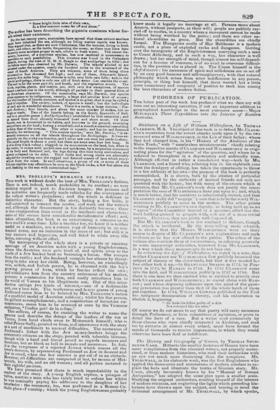11119. TROLLOPE'S ROMANCE OF VIENNA.
Tins work is without doubt the best of Mrs. TROLL one's fictions. There is not, indeed, much probability in its conduct ; no very striking regard is paid to Austrian usages; the persons and the narrative are frequently made vehicles for the conveyance of the vulgar writer's prejudices ; and the whole is deficient in
distinctive character. But the story, bating a few halts, is well contrived to interest the reader, and work out the writer's end, although the denouement is too distinctly foreseen ; there is less exaggeration than usual in the incidents and characters ; some of the scenes have considerable melodramatic effilet ; and, taken altogether, the book is as entertaining a romance as we have read for some time. Like a tumbler toy, we know it is neither useful as a machine, nor a correct copy of humanity in an ana- tomical sense, nor an imitation in the sense of art ; but still it is Very curious and ingenious, and well fitted to while away idle hours, amusing without effort. The mainspring of the u hole story is a private or runaway marriage of an Austrian noble with a young Englishwoman, whom the Austrian soon gets tired of, and spirits away to the castle of a Jew banker bent on becoming a baron. She escapes from the castle; and the husband compels her silence by threat- ening to take away her child. Being, however, an exceedingly vain, selfish, and foolish perscn, he is charmed with the boy's growing graces of form, which he fancies reflect his own ; and withdraws him from the country retirement of his mother, procures a commission for him, and coolly introduces him to the world of Vienna as his illegitimate son. Out of this intro- duction springs two kinds of interest, —one of a fashionable sort, one a love tale. The tenderness and heroic graces of young Ferdinand cause hint to be beloved by Mrs. TitossoPE's notion of a youthful model of Austrian noblesse ; whilst his tine person, his gallant accomplishments, and a combination of fortuitous cir- cumstances, cause him to be received at once by the Viennese exclusives, "l'enfan gat 6 de la mem."
This suffices, of course, for enabling the writer to name the persons and describe the doings of the leaders of the ton at Vienna, from local chiefs even to Metternich himself; who is called Prince Sully, painted en beau, and interwoven with the story ass sort of machinery to unravel difficulties. The connexion of Ferdinand's father with the Jew money-lenders brings the aristocratic citizens on the stage, painted with tolerable fairness, though with a hard and literal pencil as regards manners and furniture, but as black as hell in morals and meanness. In fact, Itis the vengeance of a rejected Jewess which causes all the lover's distress, by representing Ferdinand as Jew in descent and Jew in creed, st hen the bar sinister is got rid of as an obstacle. However, all difficulties are conquered at last, by means of Met- teriPell. his wife, and an old woman; and all parties restored to thew rightful position.
We have premised that there is much improbability in the conduct of the story. A young English orphan, a paragon of virtue, marries a man who has vainly tried to seduce her whilst be was nominally paying his addresses to the daughter of her benefactor : the ceremony, too, was performed in a Roman Ca- tholic place if worship ; which the young Englishwoman probably
knew made it legally no marriage at all. Persons move about Austria, without passports, at their will; people are publicly car- ried off to castles, in a country where a movement cannot be made without being watched by the police; and there are ether na- tional absurdities as gross. But the absurdities are chiefly formal. The Hungarian castle of Her Balthazar is a modern castle, not a place of exploded racks and dungeons. Getting over the incongruity of the Englishwoman marrying such a man as Count Alderberg, and in such a way, her character is well drawn ; but her strength of mind, though almost too self-depend- ent for a heroine of romance, is of no avail to overcome difficul- ties, in the position she is placed in. The Count himself is the chef-dceucre : his meanness of spirit and selfishness are so set off by an easy good-humour and self-complacency, with that natural philosophy which arises from utter indifference to any person, principle, or thing but himself, that there wanted but a little more consistency and congruity of position to rank him among the best characters of modern fiction.


























 Previous page
Previous page